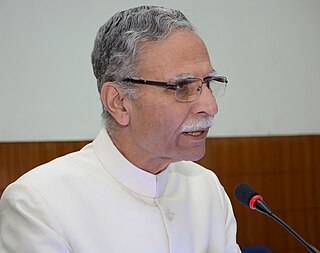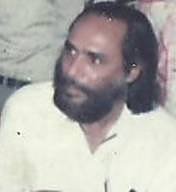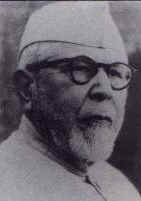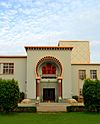
Sir Syed Ahmad Khan, also spelled Sayyid Ahmad Khan, was a Muslim reformer, philosopher, and educationist in nineteenth-century British India.

SirZiauddin Ahmad was an Indian mathematician, parliamentarian, logician, natural philosopher, politician, political theorist, educationist and a scholar. He was a member of the Aligarh Movement and was a professor, principal of MAO College, first pro vice-chancellor, vice chancellor and rector of Aligarh Muslim University, India.
Nawab Ali Yavar Jung Bahadur was an Indian diplomat. He served as Indian Ambassador in Argentina, Egypt, Yugoslavia and Greece, France, and the United States.

Lieutenant General Zameer Uddin Shah, PVSM, SM, VSM is a retired senior general of the Indian Army. He last served as the Deputy Chief of the Indian Army Staff. After retirement, he served for some time as an administrative member on the bench of the Armed Forces Tribunal. He was the vice-chancellor of Aligarh Muslim University.
Syedna Tahir Saifuddin School, better known by its initials STS School, and by its former name Minto Circle, is a K–12 semi-residential high school under Aligarh Muslim University at Aligarh, Uttar Pradesh, India. Established by Sir Syed Ahmad Khan as Muhammadan Anglo-Oriental Collegiate School in 1875, it later evolved as Aligarh Muslim University and is one of the five senior secondary schools run by the university.

Mohammad Habib (1895–1971) was an Indian Marxist historian, who worked at the Aligarh Muslim University. He was involved in the Indian Independence movement, and was an associate of both Gandhi and Jawaharlal Nehru.

Israr Ahmad was an Indian theoretical nuclear physicist and professor at Aligarh Muslim University since 1961. He was known for his work in quantum scattering theory.

Abdul Majeed Khwaja was an Indian lawyer, educationist, social reformer and freedom fighter from Aligarh. In 1920, he along with others founded Jamia Millia Islamia and later served its vice chancellor and chancellor.
Tehzeeb-ul-Ikhlaq is a magazine established by the Muslim reformer Sir Syed Ahmad Khan in 1871. The magazine published alternative Muslim perspectives, written in plain language. It gave voice to the publisher's religious, social, and reforming opinions, and is credited with establishing him as one of the fathers of Urdu fiction. Publication was interrupted in 1961 but restarted by Syed Hamid in 1981. Since then it is being published regularly. There is now a separate office of Tehzeeb-ul-Ikhlaq.
Abu Bakr Ahmad Haleem was a Pakistani Muhajir political scientist and the first vice-chancellor of Karachi University.

Aligarh Muslim University Malappuram Centre Or AMU-Malappuram Campus is one of the prominent educational institution of Aligarh Muslim University in south India in the state of Kerala in Malappuram district near Perinthalmanna at Cherukara post. It was established in 2010 by the ministry of Human resource and Development, central government of India. The President of India in her capacity as the Visitor accorded sanction to establish two Centers of Aligarh Muslim University, one at Malappuram and the other at Murshidabad in 2010.

Aligarh Muslim University is a public central university in Aligarh, Uttar Pradesh, India, which was originally established by Sir Syed Ahmad Khan as the Muhammadan Anglo-Oriental College in 1875. Muhammadan Anglo-Oriental College became Aligarh Muslim University in 1921, following the Aligarh Muslim University Act. It has three off-campus centres in AMU Malappuram Campus (Kerala), AMU Murshidabad Centre, and Kishanganj Centre (Bihar).
The Aligarh Movement was the push to establish a modern system of Western-style scientific education for the Muslim population of British India, during the later decades of the 19th century. The movement's name derives from the fact that its core and origins lay in the city of Aligarh in Central India and, in particular, with the foundation of the Muhammadan Anglo-Oriental College in 1875. The founder of the oriental college, and the other educational institutions that developed from it, was Sir Syed Ahmed Khan. He became the leading light of the wider Aligarh Movement.
Sahibzada Aftab Ahmad Khan was an attorney and educator. He was a former vice chancellor of Aligarh Muslim University.
The Faculty of Law, Aligarh Muslim University is the law school of the Aligarh Muslim University which has a history of over 100 years of teaching and writing law. Law classes were inaugurated by Justice Douglas Straight on December 29, 1891.
Siddons Union Club, commonly referred to as 'The Siddons Union', was established in the year 1884 at Muhammadan Anglo-Oriental College, the present day Aligarh Muslim University. The club was named after Henry George Impey Siddons, the first principal of the college. the Siddons Debating Union Hall, the debating chamber, was constructed which consist of a debating hall, a library and a reading room. The Cambridge Union Society gave birth to debating societies of the prominent universities of the world namely Oxford Union, Yale Political Union. Siddons Union Club hosted a number of National and International Politicians, Writers, Nobel Laureates, Players, and Journalists, including the Dalai Lama, Mahatma Gandhi, Maulana Abul Kalam Azad, Jawahar Lal Nehru.
The Aligarh Muslim University Students' Union (AMUSU) is the official Students' Union of the Aligarh Muslim University, Aligarh, India. The Aligarh Muslim University Students' Union is the university-wide representative body for students and is autonomous in nature. It works according to their own Constitution written by Amin A. Bulbuliya. It is primarily responsible for building and preserving a healthy political culture and an atmosphere of open debates on the campus. Students are kept informed about the public meetings, discussions and other issues through pamphlets and notices.

The Law Society is a body of students from Aligarh Muslim University's faculty of law. The body has produced lawyers, judges and politicians. It is an educational and representative body with an estimated 1000 active members. It is involved in training and preparing students for various competitive activities like Moot Court, Legal debate, Quiz, Judgment writing etc. of the Faculty. It was founded in 1894 as a non-profit student organization. It has long traditional character which always uplifts the students' participation and performance in relation to legal affairs in different arena. The Dean, Faculty of Law, Aligarh Muslim University, Aligarh is the President of the Society.

The history of Aligarh Muslim University begins with the Aligarh movement, which was a movement to establish a Western style of education for the Muslims of British India. The movement was pioneered by Sir Syed Ahmed Khan, who founded the Muhammadan Anglo Oriental College in Aligarh. Sir Syed retired at Aligarh, and undertook the charge of raising funds for the college, and supervising the construction of the campus.










